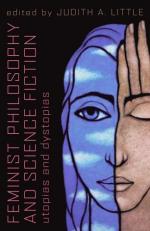|
This section contains 2,356 words (approx. 8 pages at 300 words per page) |

|
Part of being human is the ability to dream of a better (or worse) life, either in this world or the next. Some dreams have led to the study of nature and humans, from the deep mysteries of the atom and the gene, to the even deeper challenges of individual and collective sanities—all with an understanding that how one acts can be as important as why, especially when studies of nature (science) and how to transform nature (technology) confer ever greater powers and responsibilities on human beings. Some of humanity's best thinkers and artists have, for 2,500 years, created moral compasses by distilling human wisdom (and folly) into imaginative works called utopias and dystopias (sometimes called anti-utopias). These compasses are neither timeless nor universal; instead, their poles are constantly aligned and realigned by the forces of history, economics, politics, and aesthetics. Messages from these...
|
This section contains 2,356 words (approx. 8 pages at 300 words per page) |

|


